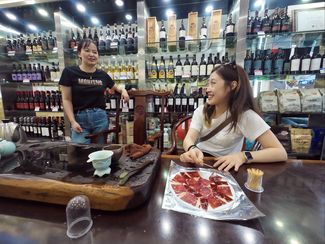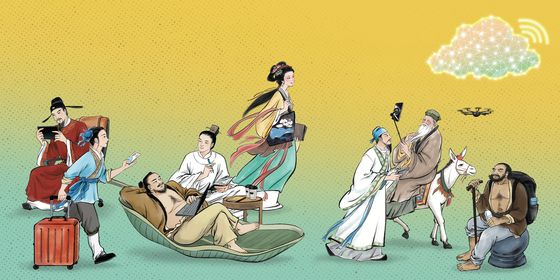As one of the oldest professions, chefs have inspired many idioms that show wisdom beyond the act of cooking itself
Originally serving the rich and powerful, chefs are perhaps among the world’s oldest professions. One of the earliest recordings of Chinese chefs occurred during the Shang dynasty (1600 – 1046 BCE), as a man of humble origins rose to advise a king through the art of cooking.
Yi Yin (伊尹), who lived between the 17th and 16th centuries BCE, is believed to have been born a slave or peasant and trained in cooking. He initially joined the household of Shang Tang (商汤), the founder of the Shang dynasty, as part of the king’s consort’s dowry. From there, he worked his way up to become an influential statesman who helped Shang Tang defeat and replace the Xia dynasty (c. 2070 – 1600 BCE).
Learn more about Chinese idioms:
- Idiomized: 4 Characters That Weighed Too Little
- Idiomized: How to Flaunt Your Wealth in 4 Characters
- Idiomized: How to Spend Your Vacation in 4 Characters
According to Master Lü’s Spring and Autumn Annals (《吕氏春秋》), a collection of historical texts compiled in the third century BCE, Yi described cooking techniques and compared them to the governing of a state: “The changes in the pot are so subtle that they’re hard to express, like the fine skills of archery or chariot driving, the natural shifts of yin and yang, or the change of seasons…A ruler cannot govern by will alone but must first grasp the Dao, which is found in self-cultivation.” It is this insight—drawing lessons in state governance from cooking—that earned Yi the honor of being remembered as the ancestral master of all chefs in traditional Chinese culture.
Chefs, cooks, and the culinary arts in general have also inspired many Chinese idioms, reflecting wisdom that goes beyond the kitchen.
Fried in oil and scorched by fire 油煎火燎
Frying and roasting may create a delicious meal, but when you’re the one in the pan, it’s another story entirely. This idiom captures a feeling much like “a cat on a hot tin roof,” conveying sharp anxiety and urgent tension—as if you were literally sizzling over an open flame.
With the project deadline approaching, the team is working frantically under pressure, feeling as if they are being fried in oil and scorched by fire.
项目快到截止日期了,团队成员们都忙得油煎火燎。
Add oil and vinegar 添油加醋
Sprinkling in some oil and vinegar to “cook up” a story means more than just adding a little flavor; it distorts the facts. As this idiom suggests, it describes embellishing or embroidering events when relaying them to someone else, often with the intent of inflaming the audience.
Don’t believe what he says; he often embellishes the truth, adding “oil and vinegar” when telling stories.
别相信他说的话,他常常添油加醋。
Stew the dragon and roast the phoenix 烹龙炮凤
It is often the rare ingredients that make a dish truly special, and when mythical creatures are on the menu, the banquet must be priceless. Coined by the Tang dynasty (618 – 907) poet Li He (李贺), renowned for his bold imagination and inventive use of unusual characters, this idiom describes a lavish feast where the rarest and most exquisite ingredients are prepared for the table.
“Dragons are stewed, phoenixes roasted—their jade-white fat murmurs in the cauldron. Fragrant air drifts within the embroidered silken screens (烹龙炮凤玉脂泣,罗屏绣幕围香风),” wrote Li in his poem “Bring in the Wine (《将进酒》).”
This feast is truly lavish and extraordinary.
这桌宴席堪称烹龙炮凤。
Cooking without rice 无米之炊
No matter how skilled a cook, one cannot conjure a meal from nothing. This is the wisdom captured by the idiom: you can’t make something out of nothing. Its origins trace back to a 12th-century folk saying, recorded by the poet Lu You (陆游) in his Notes from the Old Scholar’s Study (《老学庵笔记》): “How can a clever housewife make soup dumplings without flour? (巧妇安能作无面汤饼乎?)” Over time, it evolved into the saying we are familiar with today: “A clever housewife cannot cook a meal without rice (巧妇难为无米之炊, qiǎofù nán wéi wú mǐ zhī chuī).” The idiom based on the saying, 无米之炊, became a timeless reminder that the skill alone cannot overcome the absence of essential resources.
Without research materials, writing a paper is like trying to cook without rice.
没有研究资料,写论文完全是无米之炊。
Overstep the cook’s place 越俎代庖
In the workplace, everyone has clearly defined roles. Telling your colleagues how to do their jobs, or doing the work for them, is generally frowned upon. The ancient Chinese equivalent of this situation is a priest crossing over the altar to take up the cook’s chopping block. Originating from a story in Zhuangzi (《庄子》), a classic Daoist text compiled as early as the fourth century BCE, this idiom means to overstep one’s bounds and meddle in another’s affairs.
In the original story, the legendary ruler Yao (尧) wished to pass his throne to a hermit named Xu You (许由), believing him to be more virtuous and capable. But Xu declined, saying that everyone has their own duties and should not interfere with others’ roles, illustrating this point with the analogy of the priest and the cook.
Parents should let their children make their own plans, rather than overstepping and doing it for them.
家长应该让孩子自己做计划,而不是越俎代庖。
Governing a large country is like cooking a small fish
治大国,若烹小鲜
Just as Yi Yin once drew an analogy between the art of cooking and the art of governing, the founder of Daoism, Laozi, compared ruling a country to cooking a small fish (or, as some interpret, “a small dish”) in his classic text, the Dao De Jing (《道德经》). Though Laozi’s words are strikingly concise, it’s easy to see why a serious and delicate matter like governance might resemble frying a small fish: flip it too often, and it falls apart into mush; use too much heat, and it burns in an instant. Even the seasoning requires a gentle touch. Laozi went on to explain that one should “govern the state with Dao, and destructive forces will lose their power” (以道莅天下). Quoted and practiced by countless scholars and statesmen throughout history, this saying continues to serve as a guiding principle of modern governance—advocating policy stability, measured balance, and coordination of diverse interests.












